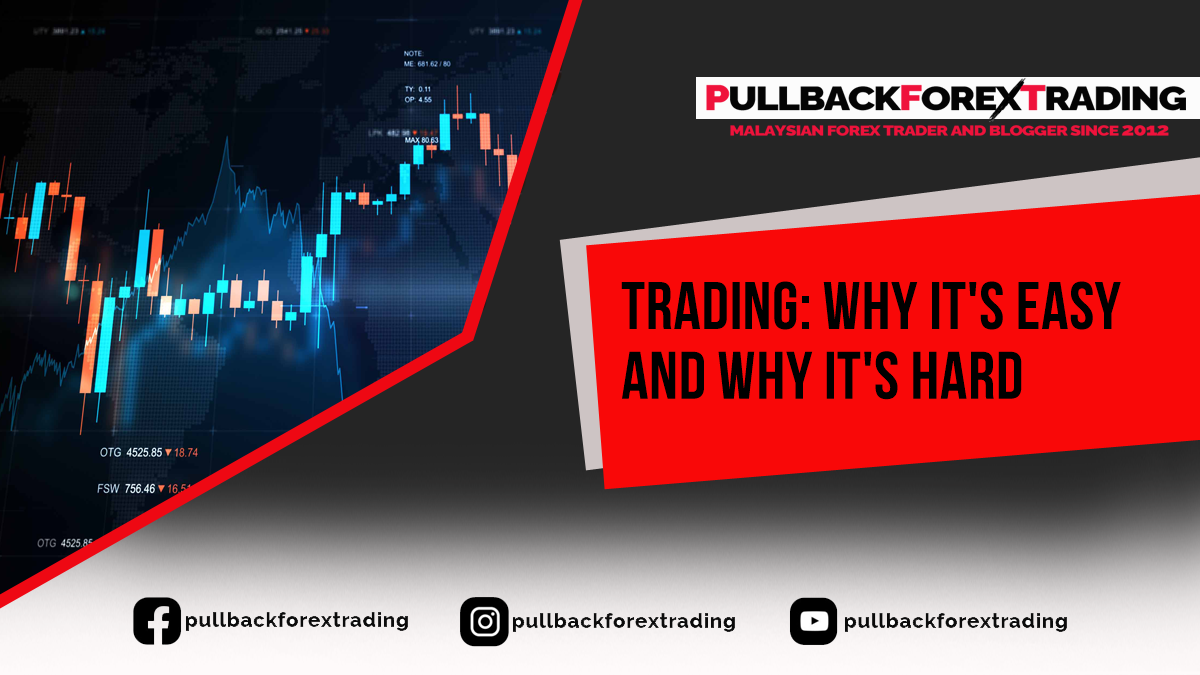
Why sometime trading feel so easy
Trading can sometimes feel easy due to a combination of favorable market conditions, psychological factors, and luck. Here are a few reasons why it might feel effortless at times:
- Trending Markets: In a strong uptrend or downtrend, it can be easier to predict price movements, making it feel like trades are “easy wins.”
- Confirmation Bias: When trades go well, it’s natural to focus on the wins and overlook potential risks or past losses. This creates a false sense of ease.
- Simple Strategies Work: Sometimes, market conditions align with basic strategies (like support/resistance or trend-following), and they seem to work without much effort.
- Emotional State: After a few consecutive winning trades, traders can feel confident or even overconfident, which might make them think they have mastered the market.
- Short-Term Gains: When traders experience quick profits, they may attribute success to their skills rather than the randomness of the market or favorable conditions.
However, markets are always changing, and what feels easy at one moment can quickly become challenging when conditions shift. That’s why it’s important to maintain discipline and a strong risk management plan.
But why it felt like sometime very hard to trade the market?
Trading the market can feel very hard at times due to a combination of external factors, psychological challenges, and market unpredictability. Here are some key reasons why it can be difficult:
1. Market Uncertainty and Volatility
- Complexity: Markets are influenced by countless variables—economic data, geopolitical events, central bank policies, and market sentiment. It’s difficult to analyze or predict all factors accurately.
- Unpredictability: No matter how well-researched a trade is, market movements are often random or driven by factors outside of a trader’s control, such as sudden news or major shifts in sentiment.
- Volatility: High volatility can lead to sharp price swings, causing trades to quickly move against you, even if you were initially correct in your analysis.
2. Overthinking and Analysis Paralysis
- Too Much Information: With an overwhelming amount of indicators, strategies, and data to analyze, traders can overthink or second-guess their decisions. This creates hesitation and confusion, making it harder to execute trades confidently.
- Contradictory Signals: Different indicators or timeframes may provide conflicting signals, leading to indecision or incorrect moves.
3. Psychological Pressure
- Fear of Losing: Trading is inherently risky, and fear of loss can paralyze a trader. This fear can lead to hesitation, missed opportunities, or premature exits.
- Overconfidence: After a string of wins, traders might become overconfident and start taking reckless trades or using larger positions, leading to losses that feel particularly hard to bear.
- Emotional Overload: Emotions like frustration, anger, or anxiety from previous losses can cloud judgment, making it hard to stick to a plan or make rational decisions.
4. Market Manipulation and Liquidity Traps
- Market Manipulation: Large institutions or algorithmic trading can create false signals, causing rapid price changes that trap smaller traders in losing positions.
- Low Liquidity: In certain markets or during off-peak hours, lower liquidity can make it harder to execute trades at desired prices, causing slippage or unfavorable fills.
5. Adaptation Challenges
- Changing Market Conditions: Markets are dynamic, and strategies that worked well in one environment may suddenly stop working as conditions change (e.g., from trending to range-bound markets). Adapting to new conditions can be difficult.
- Strategy Inconsistency: When a strategy stops working temporarily, traders might switch to different strategies too quickly, leading to inconsistency and more losses.
6. Pressure to Succeed
- Financial Pressure: If a trader is trading with the intention of making a living, the pressure to succeed can cloud judgment and lead to emotional decisions that result in mistakes.
- Expectations vs. Reality: Many traders enter the market with unrealistic expectations, believing they can get rich quickly. When reality hits and trades don’t go as planned, frustration makes the process seem harder than it actually is.
7. Self-Sabotage
- Lack of Discipline: Inconsistent adherence to a trading plan, letting emotions influence decisions, or overtrading can result in poor outcomes that feel as if the market is impossible to trade.
- Revenge Trading: After losing trades, some traders try to “get back” at the market by placing impulsive, high-risk trades. This emotional response can lead to even bigger losses.
Ultimately, the market is challenging because it requires a combination of skill, discipline, psychological strength, and adaptability. Even professional traders experience periods where trading feels difficult, especially during market transitions or high volatility phases.
Summary
Why Trading Feels Easy:
- Favorable Market Conditions: Strong trends or predictable price movements make it easier to execute winning trades.
- Simple Strategies Working: Basic strategies like trend-following or support/resistance perform well in certain conditions.
- Confirmation Bias: Focusing on wins and ignoring losses creates a false sense of ease.
- Short-Term Success: Quick wins can boost confidence, making trading seem effortless.
- Emotional Momentum: Winning streaks build overconfidence, making the process feel simple.
Why Trading Feels Hard:
- Market Unpredictability: The market is influenced by countless, often random, factors that are difficult to predict.
- Overthinking & Conflicting Signals: Too much information or contradictory indicators lead to hesitation or poor decision-making.
- Psychological Pressure: Fear of losing, emotional overload, or overconfidence can cloud judgment and lead to mistakes.
- Changing Conditions: Markets constantly evolve, and strategies that worked before may stop working in new environments.
- Self-Sabotage: Emotional decisions like revenge trading or inconsistent discipline can create additional difficulties.
The ease or difficulty of trading depends on external market conditions and internal psychological factors.

